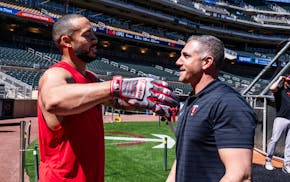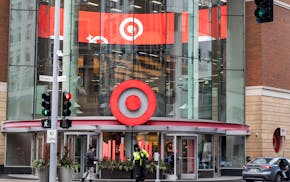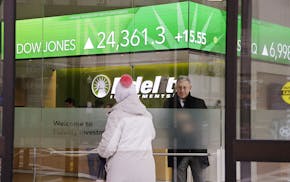Mike Herman has gone from a young fan rooting for the Twins to a seasoned veteran on the team for the past 25 years.
Had that quarter-century played out on the mound rather than inside the clubhouse, he'd have already matched the long tenure of Twins Hall of Fame pitcher Jim Kaat. And Herman's still going.
The 49-year-old has been senior director of the MLB team's travel since 2012, having first worked his way up from public relations intern in 1999 to PR director.
His job: plan every detail of every trip in a 162-game season, ensuring the players, coaches, front office staff and all their friends and families make it to and from on time. That includes booking flights, hotel rooms, buses and equipment trucks for a travel party that can easily top 50 people.
And that's just from April through October, should the team make it to the postseason. In the offseason, Herman plans all the logistics for spring training, which starts in February. And, yes, he's present in Fort Myers, Fla., for that full preseason, too.
It totals up to a lot of time spent watching baseball and getting to know All-Stars like Byron Buxton and Carlos Correa.
"It's a fun job that, from the outside looking in, it probably appears to be even more fun," Herman said. "It's still a job, right?"
A prime example of that: when the Twins won their first postseason game since 2004, finally overcoming a 18-game playoff losing streak in 2023.
"When everybody was celebrating here after we beat Toronto, that door was exactly how it is right now," Herman said, pointing to his closed office entry. "All I hear is people yelling and screaming and drinking and having fun. And I'm in here working because we have to move on. ... I'm trying to figure out the flight manifest to Houston, the hotel room list. We had a family plane and a team plane, two different airlines."
There's a lot to keep track of and not always a lot of time to do so. But even the stressful memories Herman qualifies as "good problems to have."
When he reached that 25th anniversary in April, the league issued him a Lifetime Pass gold card, good for him and a guest to attend any regular-season game in any ballpark.
"I can get tickets from pretty much anybody at this point in my career," Herman admitted. "But it's more what it means: You've lasted 25 full-time years in this industry, and I've been lucky enough to do it for my hometown team that I grew up watching."
In an interview edited for clarity and length, Herman shares what it's like to be in his shoes.
What's it like to work in a ballpark?
I grew up in Golden Valley. My mom used to drop me off at Chicago Avenue and Kirby Puckett Place. Give me a $20 bill and say, "Go enjoy the game with your friends." Then they would pick us up when the game was over. Growing up a huge Twins fan and now coming to work for the Twins is a dream. I don't drive to an office building. I drive to a Major League stadium.
When I first started with the Twins in 1999, they sold a $99 season ticket in the upper deck, right field of the Metrodome. And with the season ticket, you got an authentic, autographed Kirby Puckett bat. The bat alone was worth more than the season ticket. We had season tickets from, like, Alaska and Greenland and all over the place because they just wanted the bat. My job as an intern was to go up to Kirby's office, and I would just roll the bats to him. He'd sign them. I'd put them back in the box. I remember one time sitting up there thinking to myself, "I'm in Kirby Puckett's office!" As a little kid, I had the T-shirt with a caricature of him, with his leg kick, big head and small body. I wore that shirt all the time growing up, 7 miles down the road. And then all of a sudden, I'm sitting in his office, making sure he's signing bats that are going out to our fans. It was pretty cool.
Are there challenging parts of the gig?
I'm a department of one. I have to rely on so many other non-Twins people — like bus drivers or hotel managers — to do their job in order for my job to run smoothly. It's a unique job in that I'm dealing with a lot of people that don't like hearing, "No." My job is to make their jobs easier, where they don't have to worry about the minutiae. They just worry about playing baseball, and we, me or our equipment manager or other people, take care of all the stuff on the periphery.
Do you stay for every game?
I travel with the team. I'm lucky. I have a wife and two kids, and both my boys play baseball. I don't want to miss more than I have to, and I do miss a lot when I'm traveling. When we're at home, I usually leave once all my work is done for the day, usually around the time the players and staff go out to the field for batting practice. Then I can have dinner with my family. But I'm always here on a travel day during the game. If I'm not here, I'll watch at home, or if I'm at my sons' games, I'll have the MLB app up and watch the game or at least monitor it closely. Because if I see in the box score the starter came out after two-thirds of an inning, the chances are we're going to need another pitcher for the next day.
What surprises people about your work?
The unpredictability. It's 24/7. I might get a call at midnight or one in the morning saying, "Hey, we've got to get a player here from wherever our AAA team is, and we have a noon game the next day." So I've got to jump out of bed, fire up the computer, see if there's a flight from Des Moines or Omaha or Columbus or Toledo, and it's my job to get that person here.
Who's the most high-maintenance player, travelwise?
All their questions are usually fair: Whether or not I can execute what needs to be done in order to answer their question is the issue. It's more about them planning ahead. If a guy plans ahead, usually there are no issues. We can get things done and get them whatever they need, extra rooms, car services, rental cars, family flights, whatever. So, no, I can't really say. They all have their needs.
What's it like to be "inside baseball?"
When I was in PR, I used to work some postseasons if the Twins weren't in it, including the 2006 Cardinals-Tigers World Series. My job for MLB Productions was to get player interviews for the World Series DVD. The last guy on the list was Albert Pujols. He's asking me who I work for, how fellow Dominican Francisco Liriano is recovering from Tommy John surgery, where I got my MLB-issued World Series jacket I was wearing. He finally says, "If you can get me two extra larges and two kids' sizes, I'll go do it right now." I'm like, "Done. No problem." I called this guy from MLB productions and said, "In the next five minutes, I need you to bring me two extra large and two kid sizes of the jacket you gave me." And as soon as Albert came walking out again, I had the jackets in my hand. I don't know what would have happened if Pujols came out, and the jackets weren't there.
But then, 10, 12, 13 years later, we're in Anaheim, and I walked out between the two clubhouses to see then-Twin Nelson Cruz and Pujols having a conversation, and Nelson introduced me. I said, "Albert, we've met. 2006 World Series. I got you to go do those interviews, and I gave you those jackets." He goes, "I still have those jackets!"
You develop these relationships with people, and they don't forget, because it's a close-knit group. There aren't that many people inside the bubble. If you respect the game, you respect the people, you develop relationships, you can last a long time in this industry and have a lot of fun.
Todd Nelson is a freelance writer in Lake Elmo. His e-mail is todd_nelson@mac.com.
In Their Shoes is an occasional series highlighting Minnesotans at work. If there's a type of job you want us to profile — or if you have someone who would be a good candidate — email us at InTheirShoes@startribune.com.

From Fort Myers to Minneapolis, Twins travel guy gets team to the ballpark on time

Ramstad: Minnesota's big businesses are in crisis with a common problem

'Brady Bunch'-style split-level homes enjoying a revival in Minnesota — with a twist

Now is the time to invest in bonds, with yields too good to ignore

